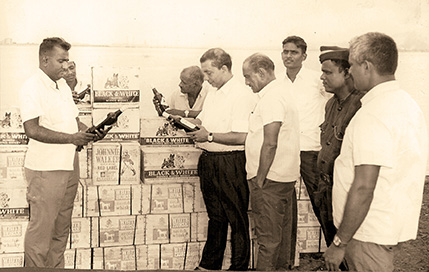Wetting your nose tip
Berjis Desai
If a Parsi vegetarian is a rarity, and a Parsi teetotaller is an oddity, then a Parsi vegetarian teetotaller is a disgrace. The community has had an unbroken love affair with alcohol and yet only a handful have a drinking problem. Alcohol de-addiction centres have a lot to learn from the Parsi approach to drinking.
Parents don’t lie to children about their daily tipple being a medicine. Nor do they drink in stainless steel glasses (those who do, ought to be prosecuted). Many a child first tasted alcohol from his grandfather’s fingertip. We tasted narangi (orange flavored country liquor — those days illegally distilled), at the age of seven, in rather strange circumstances. Aloo Aunty, a spinster (now long deceased), working in Cama Hospital, befriended us at the Victoria Terminus bus stop, discovered that we resided in her neighborhood and took us home for some delicious snack or other including, if you please, sautéed ox tongue (now it thoroughly repulses our vegetarian disposition). Aloo Aunty’s boyfriend would savor narangi at tea time and was bemused that we relished the taste of his concoction. One evening, the customary sip became a gulp and Aloo Aunty was soon banished from our young life by our stentorian grandmother who was horrified that her idyllic grandson had been sundowning bevda (slang for illicit hooch).
Parsis hated prohibition and, therefore, disliked Morarji Desai (a former prime minister and chief minister of undivided Bombay State) who imposed prohibition and was a fanatic temperance activist. There is this not so apocryphal story of Desai attending a Parsi wedding at Allbless Baug and then having the police raid the guests enjoying a secret tipple. "Saaré saparmé daharé police moklaavi! Maré muo! (Had us raided by the cops on an auspicious day. Death to him)’,” cursed the enraged Parsi ladies. Apparently, the curse did not work as Desai lived to be 99, extolling the virtues of consuming his own urine (a Parsi who ran the dining car attached to the prime minister’s special train once narrated to us, with great disgust, how Desai’s pre dawn drink was collected in a sparkling, sterilized tumbler and thoroughly relished by the ageing prohibitionist).

Seizure of illicit liquor in 1972 in Bombay by C. D. Bhesadia, assistant commissioner
of police crime branch, Crime Investigation Department
Parsis in Gujarat, suffocated by prohibition, named their illegal tipple Morarji Cola, and often dashed to nearby Daman, a central government controlled territory outside Gujarat. The famous Oliaji Hotel in Daman was a welcome watering hole for parched Parsis who after gorging on a huge breakfast of eggs, mutton mince and boi (mullet) would start guzzling toddy, juice from the palm tree collected in earthen pots tied overnight; innocent and fresh in early morning, but mischievously alcoholic before noon. Anyone drinking toddy in a glass was a novice, looked down upon by the hardened Parsis sitting on their haunches with a rolled banana leaf in their mouth through which another would pour toddy straight from the earthen pot. If your guzzling power was deficient, you would risk asphyxiation. Parsis adored the Parsi married prime minister Indira Gandhi who sent Desai into political oblivion and even jailed him during the Emergency in 1975. It must have warmed the cockles of the hearts of our Daruwallas, Pithawallas and Toddywallas who had been forced by Desai to diversify into more dull businesses.
Parsis handle their drinks extremely well and generally do not make fools of themselves in public. They may get a trifle boisterous at wedding feasts after three or four Parsi pegs, larger than the famed Patiala peg, but seldom become obnoxious. The community’s capacity to nurse, manage and hold drink is famed. We knew of an ex-sailor and his lifelong affair with mahua (a local brew made from mahua flowers, very potent). His son was warned by a legendary Parsi physician that his father would not last a fortnight as his cirrhotic liver had turned into a mini distillery. The sailor outlived the doctor and survived for 30 years thereafter on a staple diet of his elixir which he would begin to consume before noon.
Lest you wonder how a virtual teetotaller like your columnist knows about liquor, we must hasten to narrate the story of the legendary Homi Seervai, the eminent jurist who had never tasted alcohol in his long life of 89, educating the Bombay High Court with the greatest erudition on the properties of different kinds of alcoholic beverages in an excise case. There are unmarried divorce lawyers as well.
No column on Parsi drinking habits can be complete without referring to two cute Parsi expressions for boozing: "Kai chhato paani chhé ké?’ (are they serving liquor?)” and "Chalo jaraa nakh bhijjavva jaiyé (Let’s have a drink, or literally, Let’s wet our nose tips).” Given their love for the sundowner, it is a bit surprising that in the 1930s quite a few Parsis became theosophists following the teachings of Mme Helena Blavatsky, Annie Besant and Charles Leadbeater and formed a Parsi Vegetarian and Temperance Society. However, this did not prevent Parsi entrepreneurs from becoming alcohol producers, the notables being Lord Karan Bilimoria of Cobra Beer and the Contractor family in Sikkim who produced the most delightful after-dinner liqueurs of exotic origin. Even the Islamic Republic of Iran permits Zoroastrians to brew and consume aniseed liquor. Readers are cautioned though not to confuse Tehran with Riyadh. Spicy dhansak and succulent kababs washed down with aniseed liquor flavored with lime, after an invigorating trip to the Demavand Koh! This is truly keeping your spirits high (with our apologies to the Ilm-e-Khsnoomists for the totally unintended pun).
Berjis M. Desai, managing partner of J. Sagar Associates, advocates and solicitors, is a writer and community activist.
